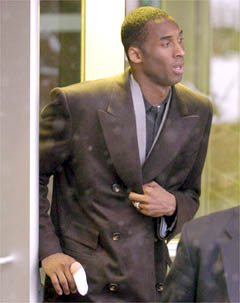|
Bryant defense hits police procedures
(Agencies)
Updated: 2004-02-04 11:34
Hammering at the work of police interrogators, defense attorneys urged a judge Tuesday to bar Kobe Bryant's secretly recorded police statement and physical evidence, including a bloodstained T-shirt, from the NBA star's upcoming rape trial.

Kobe Bryant leaves the Eagle County Justice Center. [AP] |
Prosecutors fought back, saying sheriff's investigators did nothing without Bryant's consent.
The clash was one of the fiercest yet in the series of pretrial hearings that will help determine what evidence is admitted when the Los Angeles Lakers star is tried on felony sexual assault.
The two-day hearing, which included anonymous testimony from undercover investigators, ended without a ruling. Arguments will resume March 1.
Bryant, 25, says he had consensual sex with the woman. He faces four years to life in prison or 20 years to life on probation if he is convicted.
Under sharp questions from the defense, lead investigator Doug Winters acknowledged Bryant was subjected to a hospital examination in violation of Colorado court rules.
Defense attorney Hal Haddon said the law calls for hair, fibers and other "non-testimonial evidence" to be obtained during daylight hours. Bryant's hospital exam was performed before dawn July 2, little more than 24 hours after he allegedly assaulted a 19-year-old resort employee in his room.
Winters said he didn't know about the daylight rule. He also admitted a judge had to remind him he needed two separate court orders to gather evidence: one for hair and similar evidence, and another for Bryant's clothing, including the T-shirt.
Winters' testimony covered what happened before and after Bryant's 75-minute interview with investigators in his room at the Lodge & Spa at Cordillera. State District Judge Terry Ruckriegle said the interview itself will be discussed behind closed doors because the material could harm Bryant's right to a fair trial and may not even be admitted as evidence.
Haddon said the evidence and Bryant's statement should be off-limits because investigators violated key rules. He said Bryant was effectively in custody and was being questioned without having been read his Miranda rights. He also ridiculed authorities' use of a small audiotape recorder in the shirt pocket of a detective.
But under questioning by prosecutor Dana Easter, Winters said Bryant was cooperative and always understood he was not in custody.
It was Bryant who approached the detectives in a resort parking lot, Winters said. He said Bryant casually walked with them to his room, talked with them for more than an hour, offered them clothing that was not mentioned in a search warrant and agreed to go to the hospital for a sexual assault examination.
Bryant, Winters and Detective Dan Loya rode in silence during an hour-long drive to a Glenwood Springs hospital. But after the exam, Winters said, Bryant turned to the detectives and said, "Do the best investigation that you can." They shook hands and he left with his bodyguards.
Legal experts said the judge will probably not throw out Bryant's statement and the physical evidence because there is no clear or intentional violation of a constitutional right or rule.
"The foundation is being built brick by brick to support the contention that Kobe Bryant voluntarily spoke to officers and voluntarily gave them items for DNA testing," former prosecutor Norm Early said.
Another former prosecutor, Craig Silverman, said authorities made errors, but they weren't big enough to justify barring evidence: "It was hardly textbook, but probably good enough for government work."
|